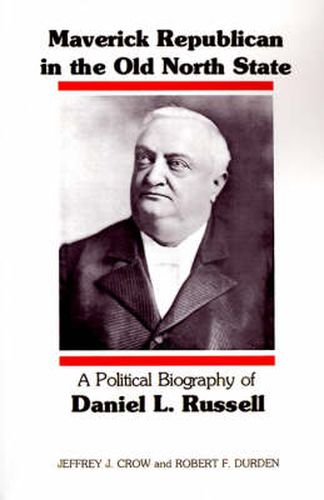Readings Newsletter
Become a Readings Member to make your shopping experience even easier.
Sign in or sign up for free!
You’re not far away from qualifying for FREE standard shipping within Australia
You’ve qualified for FREE standard shipping within Australia
The cart is loading…






This title is printed to order. This book may have been self-published. If so, we cannot guarantee the quality of the content. In the main most books will have gone through the editing process however some may not. We therefore suggest that you be aware of this before ordering this book. If in doubt check either the author or publisher’s details as we are unable to accept any returns unless they are faulty. Please contact us if you have any questions.
Daniel Russell is a good example of what Carl Degler has termed
the other South.
The son of an aristocratic eastern North Carolina family of staunch Whig-Unionists, he entered politics when the Republican party first appeared in the state after the Civil War. For more than forty years thereafter he fought the solid South mentality of the Bourbon Democrats, first as a Radical Republican judge, then as a Greenbacker congressman, and finally as a Republican governor with Populist sympathies-the only chief executive of his party that North Carolina had between Reconstruction and the 1970s.
The basic themes of Russell’s political life were racial and economic in nature. As a judge on the state superior court he ruled in the Wilmington opera house case of 1873 that blacks could not be denied accommodations on the account of their race. As a congressman he embraced the cause of currency reform and the regulation of corporate enterprise. Elected governor in 1896 by an uneasy coalition of Populists and Republicans, an alliance that Crow and Durden fully examine, he pushed reforms designed to bring nonresident corporations under stricter state supervision and challenged the ninety-nine-year lease of the state-owned North Carolina Railroad to J.P. Morgan’s Southern Railway Company. The Democrats’ triumphant white-supremacy campaigns of 1898 and 1900 and the resulting disfranchisement of black voters, however, crushed these progressive initiatives, and afterward the complex and sometimes irascible Russell kept a low profile until his tern ended in 1901. His final years were taken up by a famous interstate lawsuit that he initiated to force North Carolina to pay certain Reconstruction debts it had repudiated.
The reasons for Russell’s political failure while southern Progressives of the period generally succeeded shed much new light on the reform movement in the South between 1890 and 1910. Although the reforms that he took up were no more radical than those called for by his contemporaries, Crow and Durden find in this first full account of his career that
in the last analysis, Russell’s unique blend of Old South paternalism toward blacks with New South radicalism concerning currency and railway reform challenged too many taboos of race, class, and party.
$9.00 standard shipping within Australia
FREE standard shipping within Australia for orders over $100.00
Express & International shipping calculated at checkout
This title is printed to order. This book may have been self-published. If so, we cannot guarantee the quality of the content. In the main most books will have gone through the editing process however some may not. We therefore suggest that you be aware of this before ordering this book. If in doubt check either the author or publisher’s details as we are unable to accept any returns unless they are faulty. Please contact us if you have any questions.
Daniel Russell is a good example of what Carl Degler has termed
the other South.
The son of an aristocratic eastern North Carolina family of staunch Whig-Unionists, he entered politics when the Republican party first appeared in the state after the Civil War. For more than forty years thereafter he fought the solid South mentality of the Bourbon Democrats, first as a Radical Republican judge, then as a Greenbacker congressman, and finally as a Republican governor with Populist sympathies-the only chief executive of his party that North Carolina had between Reconstruction and the 1970s.
The basic themes of Russell’s political life were racial and economic in nature. As a judge on the state superior court he ruled in the Wilmington opera house case of 1873 that blacks could not be denied accommodations on the account of their race. As a congressman he embraced the cause of currency reform and the regulation of corporate enterprise. Elected governor in 1896 by an uneasy coalition of Populists and Republicans, an alliance that Crow and Durden fully examine, he pushed reforms designed to bring nonresident corporations under stricter state supervision and challenged the ninety-nine-year lease of the state-owned North Carolina Railroad to J.P. Morgan’s Southern Railway Company. The Democrats’ triumphant white-supremacy campaigns of 1898 and 1900 and the resulting disfranchisement of black voters, however, crushed these progressive initiatives, and afterward the complex and sometimes irascible Russell kept a low profile until his tern ended in 1901. His final years were taken up by a famous interstate lawsuit that he initiated to force North Carolina to pay certain Reconstruction debts it had repudiated.
The reasons for Russell’s political failure while southern Progressives of the period generally succeeded shed much new light on the reform movement in the South between 1890 and 1910. Although the reforms that he took up were no more radical than those called for by his contemporaries, Crow and Durden find in this first full account of his career that
in the last analysis, Russell’s unique blend of Old South paternalism toward blacks with New South radicalism concerning currency and railway reform challenged too many taboos of race, class, and party.